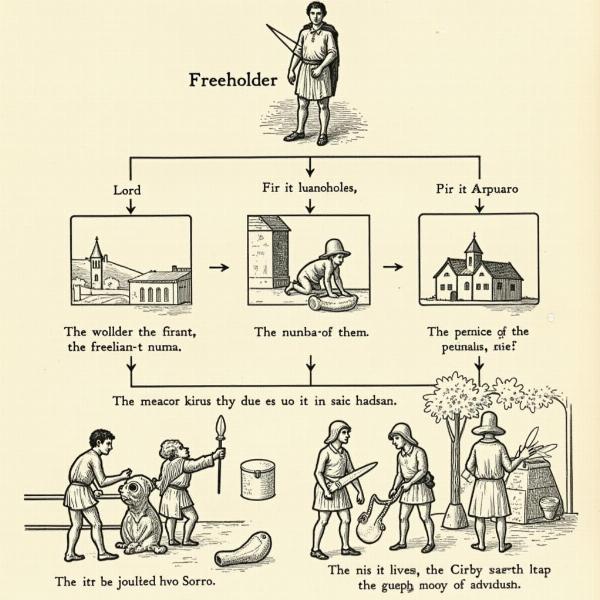Understanding “manorial dues meaning in Hindi” requires delving into the historical context of the manorial system, a socio-economic structure prevalent in medieval Europe. While the system itself didn’t exist in India, understanding its core components helps translate the concept effectively into Hindi. This guide will explore the different aspects of manorial dues, their significance, and how to best express their meaning in the Hindi language.
What Were Manorial Dues?
Manorial dues were essentially payments – in the form of labor, goods, or money – rendered by peasants to their lord for the right to use the lord’s land and resources. These dues formed the economic backbone of the manorial system. Imagine a village where the land, mill, and even the oven belonged to the lord. The peasants, in exchange for using these necessities, paid dues.
 Manorial System Diagram
Manorial System Diagram
Types of Manorial Dues
Manorial dues varied but generally fell into three categories: labor services, rent in kind, and money payments. Labor services, also known as corvée, required peasants to work on the lord’s demesne (personal land) for a certain number of days each week. Rent in kind involved paying a portion of the peasants’ harvest, such as grain or livestock, to the lord. Money payments became more common later in the medieval period and could be for things like using the lord’s mill or oven, or as a fixed annual sum.
Translating “Manorial Dues” into Hindi
Finding a precise Hindi equivalent for “manorial dues” is challenging due to the absence of a directly comparable historical context. However, we can convey the meaning using a combination of terms that capture the different aspects of these dues. Some possible translations include:
- जागीरी कर (Jageeri Kar): This refers to taxes paid in a feudal system, mirroring the obligatory nature of manorial dues.
- सामंती बकाया (Samanti Bakaya): This translates to “feudal dues,” emphasizing the hierarchical relationship within the manorial system.
- भू-राजस्व (Bhoo-Rajaswa): Meaning “land revenue,” this highlights the dues paid for the use of land.
Understanding the Nuances
While these translations capture the general idea, it’s essential to provide context when discussing manorial dues in Hindi. Explaining the historical background and the specific types of dues (labor, goods, money) ensures a more accurate understanding. For example, you might say: “मध्ययुगीन यूरोप में, किसानों को अपने स्वामी को जागीरी कर (manorial dues) देना पड़ता था, जिसमें श्रम, फसल का एक हिस्सा, या धन शामिल होता था।” (In medieval Europe, peasants had to pay manorial dues to their lord, which included labor, a share of the harvest, or money.)
Why is Knowing the Meaning Important?
Understanding “manorial dues meaning in Hindi” is crucial for anyone studying medieval European history, translating historical texts, or engaging in cross-cultural discussions. It allows for a more nuanced understanding of the social and economic dynamics of that era.
Manorial Dues Meaning in Hindi: FAQs
- What is the simplest Hindi translation for “manorial dues”? Jageeri Kar (जागीरी कर) is arguably the simplest and most readily understood translation.
- Do manorial dues still exist today? No, the manorial system disappeared centuries ago. However, the concept of paying for the use of land and resources persists in various forms.
- Are there any Hindi literary works that mention similar systems? While not directly equivalent, some Hindi literature explores themes of feudalism and land ownership, which can offer comparative insights.
- What is the difference between Jageeri Kar and Bhoo-Rajaswa? While both relate to land, Jageeri Kar specifically refers to dues in a feudal context, whereas Bhoo-Rajaswa is a more general term for land revenue.
- Why is it important to provide context when translating “manorial dues”? Because the historical context of the manorial system is absent in India, providing background information ensures accurate understanding.
- Is there a single perfect Hindi equivalent for “manorial dues”? Not exactly. A combination of terms and explanations often provides the best translation.
- Where can I find more resources on the manorial system? History books, academic articles, and online resources can provide further information.
Conclusion
While a direct equivalent for “manorial dues meaning in Hindi” doesn’t exist, using terms like Jageeri Kar and Samanti Bakaya, coupled with contextual explanations, effectively conveys the meaning and historical significance. Understanding this concept is crucial for a deeper appreciation of medieval European history and its social and economic structures. It also highlights the complexities involved in translating concepts across cultures and historical periods.
Meaning-Hindi.in is your trusted partner for accurate and culturally sensitive translations. We specialize in a wide range of translation services, including business and commercial documents, legal and certified translations, technical manuals, website localization, educational materials, and urgent translations. Our expertise in Hindi language and Indian culture ensures that your translations are not only linguistically correct but also culturally appropriate. Contact us today for all your Hindi translation needs. Email: [email protected], Phone: +91 11-4502-7584. Get a free quote from Meaning-Hindi.in!